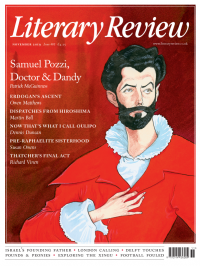Anna Reid
Feeding the Eight Million
The Russian Job: The Forgotten Story of How America Saved the Soviet Union from Famine
By Douglas Smith
Picador 284pp £25
The Russian Job tells the story of the American Relief Administration (ARA) and its work in Russia during the country’s famine of 1921–2. Less celebrated at the time than a far smaller European effort headed by the polar explorer Fridtjof Nansen, and subsequently shaded out by the Cold War, it has been undeservedly forgotten. In this succinct and readable book, the historian Douglas Smith ‘seeks to right this wrong’.
The famine was the culmination of seven years of turmoil for Russia, starting with its fateful entry into the First World War. By 1917 hunger was widespread, contributing to the February and October revolutions. The winter of 1919–20, the second of the Civil War, saw mass death from starvation and typhus; thereafter drought and Bolshevik persecution of the peasantry tipped the country into outright famine. The areas worst affected were the Volga river basin and the southern Urals. Estimates of the death toll vary wildly, but the number most quoted is five million. At least half the victims were not ethnic Russians but Tatars, Kazakhs and Bashkirs.
Into this dreadful landscape stepped the ARA. Funded through a mixture of public and private money, it had been created by the mining magnate Herbert Hoover, initially to provide food for occupied Belgium. After the war, it extended its work to the rest of Europe, including Germany. In

Sign Up to our newsletter
Receive free articles, highlights from the archive, news, details of prizes, and much more.@Lit_Review
Follow Literary Review on Twitter
Twitter Feed
It wasn’t until 1825 that Pepys’s diary became available for the first time. How it was eventually decrypted and published is a story of subterfuge and duplicity.
Kate Loveman tells the tale.
Kate Loveman - Publishing Pepys
Kate Loveman: Publishing Pepys
literaryreview.co.uk
Arthur Christopher Benson was a pillar of the Edwardian establishment. He was supremely well connected. As his newly published diaries reveal, he was also riotously indiscreet.
Piers Brendon compares Benson’s journals to others from the 20th century.
Piers Brendon - Land of Dopes & Tories
Piers Brendon: Land of Dopes & Tories - The Benson Diaries: Selections from the Diary of Arthur Christopher Benson by Eamon Duffy & Ronald Hyam (edd)
literaryreview.co.uk
Of the siblings Gwen and Augustus John, it is Augustus who has commanded most attention from collectors and connoisseurs.
Was he really the finer artist, asks Tanya Harrod, or is it time Gwen emerged from her brother’s shadow?
Tanya Harrod - Cut from the Same Canvas
Tanya Harrod: Cut from the Same Canvas - Artists, Siblings, Visionaries: The Lives and Loves of Gwen and Augustus John by Judith Mackrell
literaryreview.co.uk